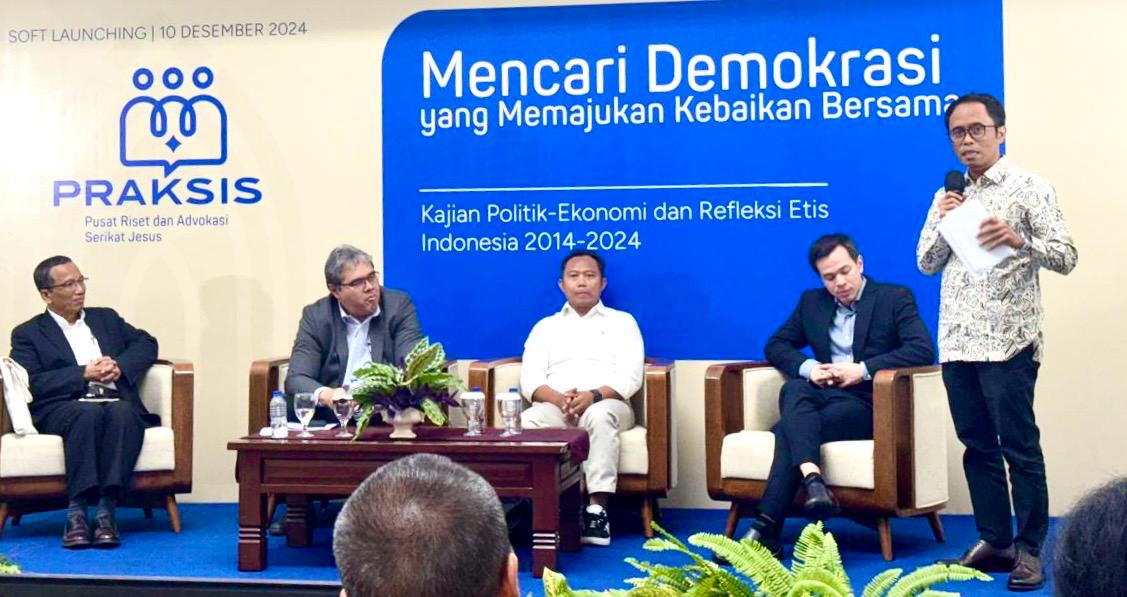The Jesuits in Indonesia have officially launched a new research and advocacy center named PRAKSIS, coinciding with Human Rights Day on Dec. 10.
The name PRAKSIS, derived from the Indonesian phrase “Pusat Riset dan Advokasi Serikat Jesus” (Jesuit Centre of Research and Advocacy), reflects its commitment to fostering democracy and the common good.
Located in Central Jakarta, PRAKSIS aims to address the many challenges that Indonesia’s democratic project faces.
Its tagline, “Seeking Democracy to Foster the Common Good,” highlights the center’s focus on promoting a uniquely Indonesian form of democracy.
“Democracy in Indonesia is a project that is not yet completely done,” the center said in a statement.
PRAKSIS has raised concerns over Indonesia’s democratic progress in recent years, highlighting issues such as civil liberties, political rights, and the widening socio-economic gap.
According to the organization’s research, Indonesia’s political landscape from 2014 to 2024 has been characterized by “de-democratization and the shrinking of middle-class society, which was characterized by low performance of working rights, sharply declining financial capacity of the middle class, and a bigger gap on the ground.”
The center attributes these trends to “the relationship mechanism between the state and its weak society.”
Fr. Maswan Susinto, SJ, the director of PRAKSIS, said that the organization will analyze Indonesia’s political and economic developments through interdisciplinary research and ethical-theological reflections based on the Church’s social teachings.
Fr. Benedictus Hari Juliawan, the head of the Indonesian Jesuit Province, emphasized the need for collective involvement to achieve the common good. “There is no common good without common participation,” he said during the launch event.
In her keynote speech, Ms. Alissa Wahid, daughter of former President Abdurrahman Wahid (Gus Dur), criticized the current state of Indonesian democracy, noting, “Indonesian society has suffered from its democracy.”
Dr. Yanuar Nugroho, a PRAKSIS research associate, described Indonesia’s democracy as being dominated by elite control.
He said, “Indonesian democracy is characterized by unchanged established elite composition, elite-driven economy, elite-managed democracy, the weakening opposition, and only focused on short-term physical development.”
PRAKSIS aims to use its research to explore a democratic model focused on the common good. The organization said, “Based on Church’s social teachings, PRAKSIS is called to seek a role model of Indonesian democracy that is good for the common good of the people.”
The center also aims to engage in pastoral advocacy to support marginalized communities. Fr. Baskara T. Wardaya, PRAKSIS’s Research and Advocacy Director, said in an interview with LiCAS News that the center is a legal entity of the Indonesian Jesuit Province (Provindo) and focuses on research concerning human rights, democracy, and social justice.
“In its pastoral advocacy, PRAKSIS will accompany and deliver its services to those marginalized people,” he added.
With its official launch, PRAKSIS is positioning itself as a vital platform for addressing Indonesia’s ongoing democratic challenges.
As the country navigates its democratic journey, PRAKSIS pledges to contribute through research, advocacy, and engagement aimed at building a just and participatory society.







